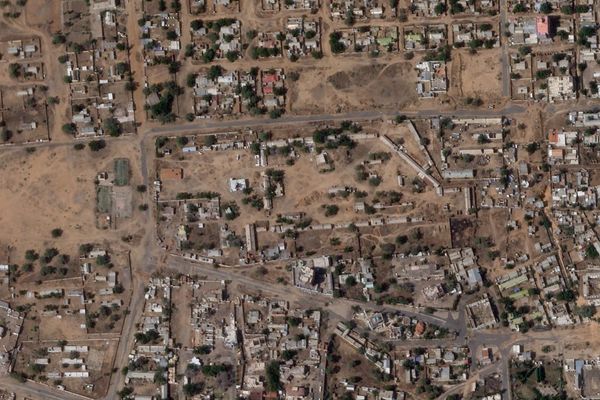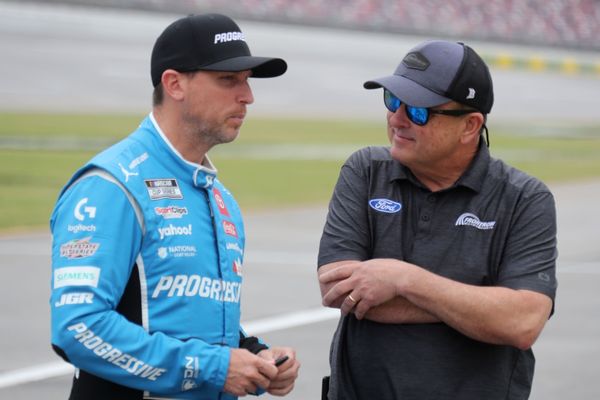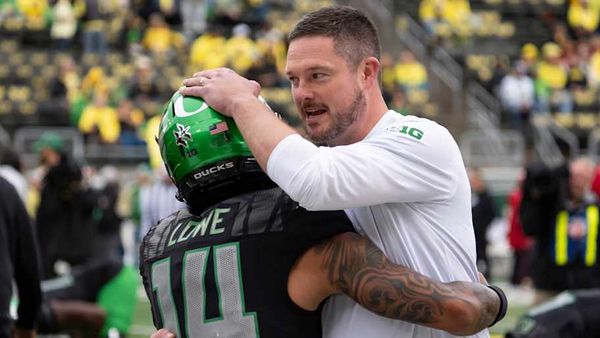With the federal government at a standstill and some red states offering up money for food assistance, Gov. Greg Abbott faces pressure to authorize the release of emergency state funding — a move he has done before — to offset the looming federal suspension of SNAP benefits this weekend for 3.5 million low-income Texans.
Some Democratic and Republican state leaders have freed up money for food banks or to continue their Supplemental Nutrition Assistance Program, also called food stamps, in November, after the ongoing government shutdown has caused federal funding for the program to run dry. Some governors declared states of emergency, which Abbott has done in the past to release funding during COVID-19, the Uvalde shooting, and for border operations.
The Texas Tribune asked Abbott’s office if he will intervene with emergency funds or join in a multi-state lawsuit to request the federal government to restore SNAP funding in November. Abbott’s office did not provide comment on those options, but said Democrats in Congress should do their part to lift the shutdown so that SNAP funding can be restored.
“There’s a simple and immediate solution to this problem that could be achieved tomorrow. Senate Democrats should immediately end their government shutdown by approving legislation that already passed the U.S. House that will fully fund the government and ensure Texans don’t go hungry,” Abbott’s statement said.
On Saturday, the federal government will halt all SNAP assistance to more than 42 million Americans who depend on it monthly because of the federal shutdown prompted by a partisan divide over whether the Affordable Care Act health insurance tax credits should be extended.
The halt means more than 3.4 million low-income Texans, including 1.7 million children, who depend on a monthly average of $400 in federal food aid, will go without it unless it’s replaced.
More than 50 Texas House Democrats signed a letter sent to Abbott on Thursday urging the governor to use his power “to save millions of Texas families from going hungry until federal funding to the Supplemental Nutrition Assistance Program (SNAP) is restored.”
Eleven Democrats in the Texas Senate later signed their own letter saying, “suspending federal benefits would intensify an already critical demand for food assistance across Texas.”
Of the estimated $8 billion in federal food assistance funding scheduled for distribution in November, $614 million would go to Texas SNAP recipients. The money is released on a staggered basis, so each day that SNAP goes without funding, benefits would expire for about 128,000 Texans daily, said Celia Cole, the CEO of Feeding Texas which represents food banks statewide.
State Rep. Armando Walle, D-Houston, said he and other lawmakers first reached out last week to Abbott’s office following news that the SNAP funds would be halted, asking whether the governor would declare an emergency and move funding from other agencies. “I haven’t gotten a response other than they’re going to look into it,” Walle said. “This is a human capital natural disaster.”
Walle, who recalled how, as a child, his own family received SNAP assistance, said it was critical to keep SNAP dollars moving uninterrupted. “Some folks need to have an appreciation for hungry children, the elderly and disabled people.”
The Texas Health and Human Services Commission, which administers SNAP benefits, referred questions on agency contingency funds that can be used on continuing SNAP to Abbott’s office.
Ways Texas could pay for SNAP in November
Abbott has previously used emergency funds to address food insecurity, mostly during natural disasters.
In 2017, Abbott expanded food benefits for Hurricane Harvey victims through the Disaster Supplemental Nutrition Assistance Program, providing two months of benefits to all eligible Texans in affected regions.
The Texas governor has also used emergency funds to mitigate the costs of the COVID-19 pandemic, provide mental health counseling following the shooting at Robb Elementary School and to reinforce the border in 2021.
In 2022, Abbott redirected hundreds of millions of dollars from state agencies to fund the border, including $210 million over a two-year period from the state’s Health and Human Services Commission, which administers SNAP.
Texas has over $20 billion in surplus to lean on if necessary, but lawmakers have been particular about how they use this money. Tapping this rainy day fund — officially called the Economic Stabilization Fund — would require state lawmakers to come back to Austin to convene in a legislative session, according to Walle’s office.
The move is also unpopular among fiscal conservatives.
“There are ample resources available, but generally speaking, those monies are best used for one-time emergencies and tax relief,” said James Quintero, policy director of conservative think tank Texas Public Policy Foundation.
SNAP, on the other hand, would be an ongoing obligation to the state amid the federal shutdown, he added.
Other states across the country that might not have such a surplus have chosen the legal route.
A coalition of officials in more than 25 states is suing the USDA over the looming suspension of the federal funding for food aid. However, Texas hasn’t joined the lawsuit, meaning that no matter the outcome in court, it won’t solve the problem here.
The lawsuit, filed Tuesday in a Massachusetts district court, was brought by various states, including Kentucky, Kansas, California, North Carolina and Oregon. They are asking a federal judge to order the USDA to provide benefits for November for the nearly 25 million people within their borders by tapping into over $4 billion in contingency funds.
“Our [temporary restraining order] seeks relief on behalf of the 26 plaintiff jurisdictions. But it is entirely up to the federal government whether they wish to unlock funds for all states whose residents rely on SNAP,” Matt Platkin, the attorney general of New Jersey, told the Tribune.
The plaintiffs argue that cutting off these payments in their states would threaten widespread hunger and food insecurity.
Congress could address the issue — without ending the shutdown — by passing a standalone bill to fund SNAP. Sen. Josh Hawley, R-Missouri, has introduced a bill to do so, though Senate Republican leadership has not scheduled a vote on it.
Though other Republican governors have stepped in to fund SNAP, Quintero said “government spending is not the solution.”
“What we’ve allowed to develop from the federal level on down is a very robust welfare system that cultivates an environment of dependency,” he said. “By continuing to throw money at this system, we’re enabling poverty to some extent, and it’s really not the best way to generate prosperity and sustainability.”
Federal versus state intervention
SNAP funding comes from the U.S. Department of Agriculture, which has put states on notice this month that any state funds used to cover SNAP will not be reimbursed.
“The President, who found $40 billion for Argentina, who is reopening USDA offices to get billions to farmers suffering from his tariff taxes, and who boasts that he can do almost anything, is refusing to tap a rainy-day fund to help seniors, veterans, and families with children. It’s not the well that’s run out, as Republicans claim; it’s their empathy for others that has run dry,” said U.S. Rep. Lloyd Doggett, D-Austin, in a statement sent out Wednesday.
But as the lawmakers’ letter to Abbott points out: “States do have the power to take temporary emergency measures, using state funds to prevent hunger and stabilize families while Congress resolves the federal impasse.”
Some states have sent emergency funding to local food banks. Cole’s group Feeding Texas has offered Abbott a strategy to help get more food to food banks and the people they serve. The group asked Abbott to increase funding for a grant that helps farmers and transportation providers send unsellable food to food banks.
“However much food we distribute, we can’t make up for the loss of SNAP benefits, but by increasing funding for the surplus ag grant, we have the ability to get more food out to people during this time of heightened need than we would otherwise be able to,” she said.
Cole said Abbott acknowledged the request, and she hopes to meet with him in the coming days.
Other states, most notably those with Republican governors such as Louisiana and Virginia, have declared the looming SNAP suspension an emergency and are tapping their state funds to continue to fund their food assistance programs. “Texas should do the same,” the letter Texas Democrats states.
When asked by the Tribune about any emergency action he would be willing to take to restore SNAP or fund local food banks, Abbott in a statement said the solution is that Democrats in Congress should reopen the federal government.
“While Democrats use low-income Texans as bargaining chips, Texas agencies are coordinating with community partners to connect families to existing assistance until the federal government gets back to work,” Abbott said in the statement. He pointed to existing resources Texans can seek to pay for food.
He suggested that Texans who need assistance in the coming weeks visit 211Texas.org or dial 2-1-1 to connect with information on a range of services, including food, housing, utilities, and health and medical services.
He also pointed to the Texas WIC program, which also provides nutritious foods, education, and other services, but it’s primarily for low-income women, infants, and children up to age 5. WIC has been criticized for its restrictions on what food can actually be purchased, forcing many families to abandon it by a child’s first birthday.
And he referenced Thriving Texas Families. This state program provides supplies to pregnant women and families as a measure to support adoption over abortion, but other than infant formula, the program is not known as a food assistance program.
Quintero said the loss of SNAP funding creates an opportunity for Texans to help each other.
“We need to give charities, nonprofits, families and other private individuals the space and the opportunity to step up and help those who are hurting,” he said. “We have not seen what the actual effect of those funds running out is, right? And so I think it’s too early to suggest that neighbors helping neighbors is inadequate.”
However, Cole said the combination of high food prices, federal workers going without pay because of the shutdown and SNAP enrollees who anticipate losing their benefits is putting increased pressure on food banks. Even after the government opens back up, it will take another three days for money to be available to participants.
“We are fully anticipating that we are going to see a surge in need in the next week or so, even if the shutdown is resolved,” Cole said.
Disclosure: Feeding Texas has been a financial supporter of The Texas Tribune, a nonprofit, nonpartisan news organization that is funded in part by donations from members, foundations and corporate sponsors. Financial supporters play no role in the Tribune’s journalism. Find a complete list of them here.







